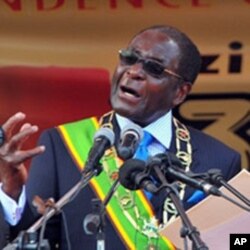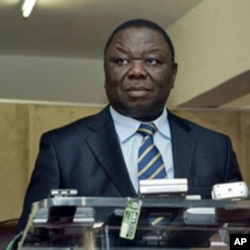Political observers say a meeting in Zimbabwe Wednesday of national executives of the unity government's three political parties has raised optimism about the country's political future. The group gathered to discuss issues that have been outstanding since the coalition government was formed, including political violence and freedom of association.
Political scientist at the University of Zimbabwe Eldred Masunugure called the meeting of three executive committees a "very significant development."
The analyst said policymakers for the three parties must reassure the public that they are serious about fulfilling a political agreement signed in September 2008, which served as the foundation for the coalition government that formally came into power in early 2009.
President Robert Mugabe has said previously his ZANU-PF party has gone as far as necessary with the political agreement. But the United States and the European Union have kept in place financial and travel restrictions on Mr. Mugabe and some of his associates.
Welshman Ncube, secretary-general for the smaller Democratic Change party said there has been much finger-pointing about past political violence. But, Ncube said, officials at the meeting agreed that President Mugabe's party was responsible for most of the political violence in the last 10 years.
"At least there is acceptance, if we talk about the past violence...that ZANU-PF, as a party, or through its agents or people it controls, did commit violence against many people," said Ncube. "There is acceptance about that. There might be excuses given for it, but I don't think anyone can deny the existence of that violence. The issue is, what can we do, and how do we move forward?"
He also said there was consensus at the meeting that Zimbabwe's Global Political Agreement, or GPA, which was signed by leaders of all three parties, has not yet been fulfilled.
"There was, of course, concern that there are some provisions in the GPA, not fully implemented, and that we must implement the GPA in its entirety," he said.
The MDC's Ncube also said the police and army had to be engaged, as they are accused of contributing to violence themselves, or standing by while violence is committed by others.
After the meeting, the ZANU-PF secretary for administration, Didymus Mutasa, said the Organ on National Healing and Reconciliation would chart a way forward for further meetings among the three parties at all levels of society.
Tendai Biti, secretary-general to Prime Minister Morgan Tsvangirai's MDC said he elated about the meeting, and added that no Zimbabwean should be punished for his or her party affiliation.
Analyst Eldred Masunungure said the timing of the meeting was crucial because it coincided with the start of the constitution-making process, which he said had been bogged down. He said the meeting had been arranged by Zimbabweans themselves, without any external input or influence.
South Africa has a team of mediators, which has met with the leaders of the three Zimbabwean political parties about several outstanding issues from the political agreement.





